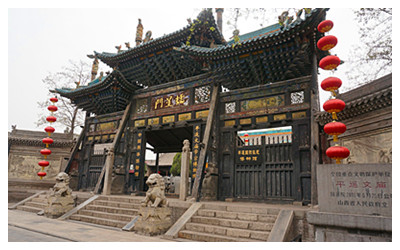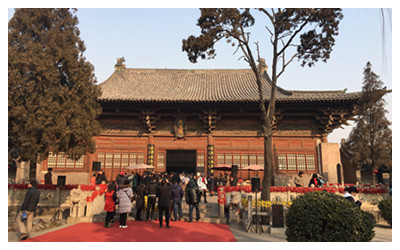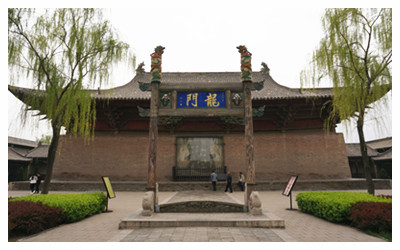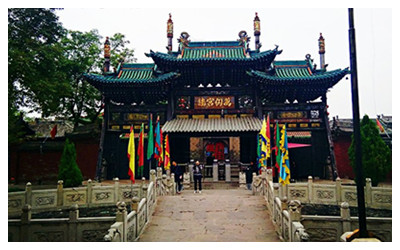Pingyao Confucios Temple, aka Wenmiao in Pingyao, is located in the southeast corner of Pingyao Ancient City. Built as early as in the Tang Dynasty (618 - 908 AD), it is one of the oldest and currently the best-preserved of its kind in China.
What to see?
The Confucios Temple is a place to worship Confucius (551 - 478 BC), a famous philosopher, educator and the founder of the Confucian school. It mainly consists of 5 courtyards from south to the north with an area of 35,811 square meters and two side courtyards to its east and west.
 Lingxing Gate
Lingxing GateLingxing is the god in charge of choosing talented people in ancient China. Therefore, a Lingxing Gate is usually set in front of Confucius Temple to show that Confucius is the representative of Lingxing on the earth. It also shows the high status of Confucius in ancient China. The Lingxing Gate in Pingyao is a traditional style wooden gate with a saddle-like roof supported by four pillars.
First Courtyard - Preparation Site for the Sacrificial Ceremony
It is right behind the Lingxing Gate. In this courtyard, there are rooms for sacrificial persons to take showers, get changed, and store sacrificial offerings. There is also a Panchi Pool in the courtyard, which is a symbolic architecture in Confucius Temples all over China. It is carved with various auspicious patterns. There is a hall to the west and another to the east, to commemorate officials and the locals who had made great contributions to Pingyao. In the north of the courtyard is the Dacheng Gate leading to the second courtyard.
 Second Courtyard
Second Courtyard - Where Confucius is Worshipped
The second courtyard is composed of Dacheng Hall the main hall,
Dongye Hall, Xiwu Hall as the side halls,
Dongye, Xiye Gates and a tablet exhibition hall. Dacheng Hall is mainly used to worship Confucius, built on a one-meter-high platform. Confucius, with mild, peaceful, but also strict and tough facial expressions is standing inside. Dongye Hall and Xiwu Hall is mainly used to worship the 72 sages of Confucius. This is also the largest-scale reappearance of Confucius’s disciples in China.
Third Courtyard- School in Old Times
Minglun Hall is the main hall of the third courtyard of Confucius Temple in Pingyao, once used as lecture room in Ming (1368 - 1644 AD) and
Qing (1644 - 1911 AD) dynasties. It is now the Confucius life showroom with plenty of precious historical materials. The Shixi Hall in the east and Rixin Hall in the west were classrooms in old times and now are the ancient education exhibition hall and ancient China calligraphy exhibition hall respectively.
 Fourth Courtyard
Fourth Courtyard - the place to Worship the Heaven
Walking through Minglun Hall, visitors enter the fourth courtyard.
Jingyi Pavilion, the main architecture, was the place to worship Heaven, a kind of religious activity in ancient China.
Fifth Courtyard - Library in Old Times
Zunjing Pavilion is the main building here, used to collect books. Chaoshan Academy, another main architecture here, is now the Chinese imperial examination showroom; there is China’s largest permanent imperial examination exhibition there.
Dongxue - East Side Buildings
Dongxue district is to the east of Confucius Temple, composed of Dongxue Palace, Chongsheng Hall and Jiexiao Hall. Dongxue Palace is the school founded by the government in ancient times and now it has become the only international photography museum and is the only one in China. Chongsheng Hall is mainly used to

worship Confucius’s father - Shu Lianghe and his ancestors. Jiexiao Hall was used to worship widows who were loyal to their husbands and did not remarry even when their husbands died young.
Xixue - West Side Buildings
Xixue district to the west of Confucius Temple was the office of the local officials. It is now used to display Chinese calligraphies and paintings.
Travel Tips
Add: No. 67, God Temple Street, Pingyao County,
Jinzhong City
Entrance Fees: CNY 125 ( This is the ticket fare of Pingyao Ancient City combo ticket, including a visit to almost all scenic sites in the ancient city).
Opening Hours: 08:00-17:30
 Lingxing Gate
Lingxing Gate Second Courtyard - Where Confucius is Worshipped
Second Courtyard - Where Confucius is Worshipped Fourth Courtyard - the place to Worship the Heaven
Fourth Courtyard - the place to Worship the Heaven worship Confucius’s father - Shu Lianghe and his ancestors. Jiexiao Hall was used to worship widows who were loyal to their husbands and did not remarry even when their husbands died young.
worship Confucius’s father - Shu Lianghe and his ancestors. Jiexiao Hall was used to worship widows who were loyal to their husbands and did not remarry even when their husbands died young. Ask Questions ?
Ask Questions ?